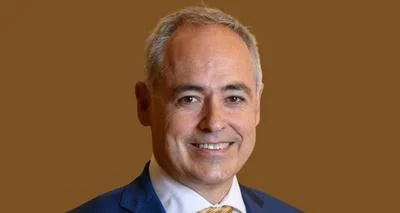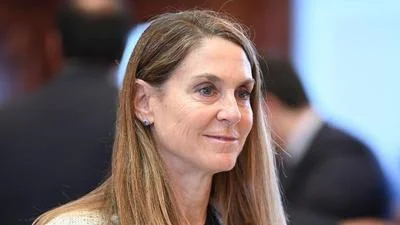Kevin John Olickal, Illinois State Representative from the 16th District | Illinois General Assembly
Kevin John Olickal, Illinois State Representative from the 16th District | Illinois General Assembly
According to the Illinois General Assembly site, the legislature summarized the bill's official text as follows: "Amends the Unified Code of Corrections. Creates the Department of Corrections Independent Ombudsperson Law. Provides that the Corrections Oversight Committee shall appoint the Independent Corrections Ombudsperson. Provides that the Independent Corrections Ombudsperson shall serve a term of 6 years and may be only removed from office by the Governor for cause. Provides that the Independent Corrections Ombudsperson shall not be a current or former employee of the Department of Corrections, the Department of Juvenile Justice, or a contractor for those departments. Establishes the duties of the Independent Corrections Ombudsperson. Provides that the Independent Corrections Ombudsperson shall: (1) monitor and inspect facilities of the Department of Corrections; (2) investigate unresolved complaints from committed persons, their families, and corrections staff regarding correctional facility conditions and treatment of committed persons; (3) create a uniform reporting system and collect and analyze data related to deaths, suicides, sexual and physical assaults, lockdowns, staff vacancies and committed persons-to-staff ratios, visits to committed persons, and use of solitary confinement in correctional facilities; (4) conduct regular inspections of correctional facilities at least once every year for facilities not meeting standards, and at least once every 36 months for facilities that are meeting standards; and (5) publicly issue periodic facility inspection reports and an annual report with recommendations and a summary of data. Establishes other duties of the Independent Corrections Ombudsperson. Provides that the Independent Corrections Ombudsperson shall report regularly on its activities, investigations, and inspections, including an annual report, which shall be presented to and discussed at a meeting of the Corrections Oversight Committee and make other reports on topics of special interest. Provides that all reports of the Independent Corrections Ombudsperson shall be made available to the public online and provided to the Director of Corrections, the Governor, the Attorney General, and the House and Senate Judiciary Committees. Effective July 1, 2026."
The following is our breakdown, based on the actual bill text, and may include interpretation to clarify its provisions.
In essence, the bill establishes the Department of Corrections Independent Ombudsperson Law, creating an office to boost transparency and accountability within Illinois's corrections system, effective July 1, 2026. The Corrections Oversight Committee will appoint an Independent Corrections Ombudsperson for a six-year term, with removal only for cause. The ombudsperson, who cannot be a current or former Department of Corrections or Juvenile Justice employee, is tasked with monitoring facilities, investigating complaints, and producing regular and annual reports. They are empowered to access facilities, conduct confidential interviews, review documents, and set up a hotline for grievances. The ombudsperson will analyze data on various correctional facility incidents and may hire staff and experts as needed. The Department of Corrections must respond to recommendations, and failure to comply may result in legal actions. The bill also protects against retaliation for filing complaints.
Kevin John Olickal has proposed another seven bills since the beginning of the 104th session.
Olickal graduated from Ohio State University in 2015 with a BS and again in 2025 from Loyola University Chicago School of Law with a JD.
Kevin John Olickal is currently serving in the Illinois State House, representing the state's 16th House District. He replaced previous state representative Denyse Wang Stoneback in 2023.
Bills in Illinois follow a multi-step legislative process, beginning with introduction in either the House or Senate, followed by committee review, floor debates, and votes in both chambers before reaching the governor for approval or veto. The General Assembly operates on a biennial schedule, and while typically thousands of bills are introduced each session, only a fraction successfully pass through the process to become law.
You can read more about bills and other measures here.
| Bill Number | Date Introduced | Short Description |
|---|---|---|
| HB1643 | 01/23/2025 | Amends the Unified Code of Corrections. Creates the Department of Corrections Independent Ombudsperson Law. Provides that the Corrections Oversight Committee shall appoint the Independent Corrections Ombudsperson. Provides that the Independent Corrections Ombudsperson shall serve a term of 6 years and may be only removed from office by the Governor for cause. Provides that the Independent Corrections Ombudsperson shall not be a current or former employee of the Department of Corrections, the Department of Juvenile Justice, or a contractor for those departments. Establishes the duties of the Independent Corrections Ombudsperson. Provides that the Independent Corrections Ombudsperson shall: (1) monitor and inspect facilities of the Department of Corrections; (2) investigate unresolved complaints from committed persons, their families, and corrections staff regarding correctional facility conditions and treatment of committed persons; (3) create a uniform reporting system and collect and analyze data related to deaths, suicides, sexual and physical assaults, lockdowns, staff vacancies and committed persons-to-staff ratios, visits to committed persons, and use of solitary confinement in correctional facilities; (4) conduct regular inspections of correctional facilities at least once every year for facilities not meeting standards, and at least once every 36 months for facilities that are meeting standards; and (5) publicly issue periodic facility inspection reports and an annual report with recommendations and a summary of data. Establishes other duties of the Independent Corrections Ombudsperson. Provides that the Independent Corrections Ombudsperson shall report regularly on its activities, investigations, and inspections, including an annual report, which shall be presented to and discussed at a meeting of the Corrections Oversight Committee and make other reports on topics of special interest. Provides that all reports of the Independent Corrections Ombudsperson shall be made available to the public online and provided to the Director of Corrections, the Governor, the Attorney General, and the House and Senate Judiciary Committees. Effective July 1, 2026. |
| HB1438 | 01/17/2025 | Appropriates $1,500,000 from the General Revenue Fund to the Office of the Independent Corrections Ombudsperson for the Offices ordinary and contingent expenses. Effective July 1, 2025. |
| HB1439 | 01/17/2025 | Amends the Illinois Insurance Code, the Dental Care Patient Protection Act, and the Dental Service Plan Act. Provides that no insurer, dental service plan corporation, professional service corporation, insurance network leasing company, company offering a managed care dental plan, company offering a point-of-service plan, or any company that amends, delivers, issues, or renews an individual or group policy of accident and health insurance that provides dental insurance in this State may deny coverage for replacement of teeth to any insured on the basis of those teeth having been extracted or otherwise lost prior to the person becoming covered under the plan. |
| HB1440 | 01/17/2025 | Amends the Property Tax Code. Provides that tax deeds issued to the county as trustee shall be recorded by the county and shall not require a municipal transfer stamp or be subject to any municipal real estate transfer taxes, requirements, or certifications prior to recording. |
| HB1426 | 01/16/2025 | Amends the Juvenile Court Act of 1987. Repeals a provision excluding certain minors accused of committing specified crimes from the jurisdiction of the juvenile court. Effective immediately. |
| HB1427 | 01/16/2025 | Creates the Prohibition of Algorithmics in Rent Act. Provides that in setting the amount of rent to be charged to a tenant for the occupancy of a residential premises, including determining any change in the amount of rent to be charged for the renewed occupancy of a residential premises, a landlord shall not employ, use, or rely upon, or cause another person to employ, use, or rely upon, an algorithmic device that uses, incorporates, or was trained with nonpublic competitor data. Defines "algorithmic device" to mean a device that uses one or more algorithms to perform calculations of data, including data concerning local or statewide rent amounts being charged to tenants by landlords, for the purpose of advising a landlord concerning the amount of rent that the landlord may consider charging a tenant. Provides that this definition does not include (i) any report published periodically, but no more frequently than monthly, by a trade association that receives renter data and publishes it in an aggregated and anonymous manner; or (ii) a product used for the purpose of establishing rent or income limits in accordance with the affordable housing program guidelines of a local government, the State, the federal government, or other political subdivision. Amends the Consumer Fraud and Deceptive Business Practices Act to make a corresponding change. Provides that any person who violates the Prohibition of Algorithmics in Rent Act commits an unlawful practice within the meaning of the Consumer Fraud and Deceptive Business Practices Act. |
| HB1428 | 01/16/2025 | Creates the Isolated Confinement Restriction Act. Provides that the Act may be referred to as the Nelson Mandela Act. Provides that a committed person may not be in isolated confinement for more than 10 consecutive days. Provides that a committed person may not be in isolated confinement for more than 10 days in any 180-day period. Provides that the provision of basic needs and services, such as nutritious food, clean water, hygiene supplies, clothing, bedding and mattress, religious materials, legal materials, access to grievance forms, and access to medical and mental health, shall not be restricted as a form of punishment or discipline for committed persons in isolated confinement. Provides that a committed person in protective custody may opt out of that status by providing informed, voluntary, written refusal of that status. Provides that a committed person shall not be placed in isolated confinement if the committed person: (1) is 21 years of age or younger; (2) is 55 years of age or older; (3) has a disability as defined in the Americans with Disabilities Act of 1990; or (4) is pregnant or postpartum. Provides that nothing in the Act is intended to restrict any rights or privileges a committed person may have under any other statute, rule, or regulation. Amends the Unified Code of Corrections to make conforming changes. Effective immediately. |
| HB1429 | 01/16/2025 | Amends the Bill of Rights for the Homeless Act. Prohibits the State or a unit of local government from creating or enforcing policies or ordinances imposing fines or criminal penalties against people experiencing unsheltered homelessness for occupying or engaging in life-sustaining activities on public property. Provides exceptions to maintain access to property or address risks to public health and safety. Creates a necessity defense for charges alleging violation of laws criminalizing life-sustaining activities while the individual was experiencing unsheltered homelessness. Defines terms. Limits the exercise of concurrent home rule powers. |






 Alerts Sign-up
Alerts Sign-up